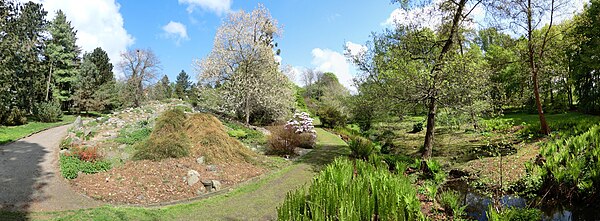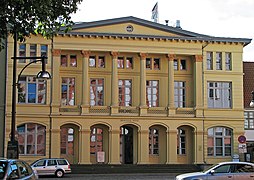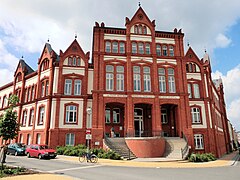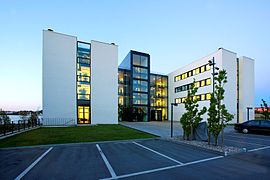University of Rostock: Difference between revisions
Extended confirmed users 1,334 edits |
Rescuing 2 sources and tagging 0 as dead. #IABot (v1.6.1) (Balon Greyjoy) |
||
| Line 154: | Line 154: | ||
===Rostock University Hospital=== |
===Rostock University Hospital=== |
||
The university operates a hospital, which has several teaching and research institutes.<ref>{{cite web |
The university operates a hospital, which has several teaching and research institutes.<ref>{{cite web|url=http://www.med.uni-rostock.de/index.php?id=273|title=Universitätsklinikum Rostock|year=2011|publisher=University of Rostock|accessdate=13 August 2011|deadurl=yes|archiveurl=https://web.archive.org/web/20110724193346/http://www.med.uni-rostock.de/index.php?id=273|archivedate=24 July 2011|df=}}</ref> Among those are the [[Albrecht Kossel Institute for Neuroregeneration]]. |
||
==Points of interest== |
==Points of interest== |
||
| Line 348: | Line 348: | ||
* [http://www.uni-rostock.de/en/ University of Rostock] |
* [http://www.uni-rostock.de/en/ University of Rostock] |
||
* [http://www.newadvent.org/cathen/13205b.htm University of Rostock] - short history in the [[Catholic Encyclopedia]] |
* [http://www.newadvent.org/cathen/13205b.htm University of Rostock] - short history in the [[Catholic Encyclopedia]] |
||
* [http://www.med.uni-rostock.de/index.php?id=644 Albrecht-Kossel-Insitut für Neuroregeneration] |
* [https://web.archive.org/web/20110420142119/http://www.med.uni-rostock.de/index.php?id=644 Albrecht-Kossel-Insitut für Neuroregeneration] |
||
* [http://cpr.uni-rostock.de/ Catalogus Professorum Rostochiensium] |
* [http://cpr.uni-rostock.de/ Catalogus Professorum Rostochiensium] |
||
* [http://matrikel.uni-rostock.de/ Rostocker Matrikelportal (1419-1945)] |
* [http://matrikel.uni-rostock.de/ Rostocker Matrikelportal (1419-1945)] |
||
Revision as of 06:45, 30 November 2017
Universität Rostock | |
DFG DAAD | |
| Website | www.uni-rostock.de |
|---|---|
The University of Rostock (Rostock University, German: Universität Rostock) is a public university located in Rostock, Mecklenburg-Vorpommern, Germany. Founded in 1419, it is the third-oldest university in Germany. It is the oldest and largest university in continental northern Europe and the Baltic Sea area, and 8th oldest in Central Europe.[3] It was the 5th university established in the Holy Roman Empire.
The university has been associated with five Nobel laureates. Famous alumni include Nobel laureates: Albrecht Kossel, Karl von Frisch, and Otto Stern; theoretical physicists: Pascual Jordan and Walter H. Schottky. It is a member of the European University Association. The language of instruction is usually German, but English for postgraduate studies.


History
It was founded in 1419 by confirmation of Pope Martin V and thus is the oldest university in Northern Europe.
In
Throughout the 15th century, the University of Rostock had about 400 to 500 students each year, a large number at that time. Rostock was among the largest universities in Germany at the time and many of its students also came from the Low Countries, Scandinavia or other states bordering the Baltic Sea.
In the course of political struggles and pressure from the church, the university moved to Greifswald in 1437 and remained there until 1443. From 1487 to 1488 teaching took place in Lübeck.
A few years later the city of Rostock, its university also became
1919–1945
On the occasion of the 500th anniversary of the university,
1945–1989
The end of the
In 1976 the university was renamed Wilhelm-Pieck-Universität after
1989–present
The regional economy has improved as over 800 companies launched from the university since 1991. External funding for research increased between 2005 and 2010 by 83% and currently is above 47 million Euros per year. Over 500 million Euros has been invested in the university infrastructure since 1991, which will reach 750 million Euros by 2015. The number of young people from the West Germany and international students who choose University of Rostock as a study location, are increasing every year. International Students from 99 different countries have been studied at University of Rostock. In 2007, the University of Rostock gathered its research capacities into three profile lines: Life, Light & Matter (LLM), Maritime Systems, and Aging of Individuals and Society. In 2010 a fourth was added, called Knowledge-Culture-Transformation. Life, Light & Matter develops new concepts for future technologies based on atomic and molecular processes in connection with laser optics and life sciences. Maritime Systems unites oceanographers, engineers, humanities scholars, agricultural and social scientists, economists and lawyers. Aging of Individuals and Society has as its target a self-determined lifestyle in old age. Knowledge-Culture-Transformation deals with media and the representation of knowledge, transformation of knowledge, knowledge and interculturalism as well as knowledge and power.
Organisation and structure
Like many continental
Faculties
It is divided into the following nine faculties:
- Faculty of Agricultural and Environmental Sciences
- Plants and Soil
- Ecology and (Coastal)-Landscape
- Biomass, Aqua and Lifestock Sciences
- Faculty of Computer Science and Electrical Engineering
- Institute of Informatics
- Institute of Electrical Engineering
- Department of Computational Engineering
- Faculty of Law
- Department of Law
- International Commercial Law
- International Business Administration
- Faculty of Mechanical Engineering and Marine Technology
- Mechanical Engineering
- Marine Technology
- Mechatronics
- Biomedical Technology
- Faculty of Mathematics and Natural Sciences
- Institute of Biology
- Institute of Chemistry
- Institute of Mathematics
- Institute of Physics
- Faculty of Medicine
- Albrecht Kossel Institute for Neuroregeneration
- General Medicine
- Dental Medicine
- Anatomy
- Medical Biotechnology
- Informatics in Medicine and Gerontology
- Diagnostic and Interventional Radiology
- Experimental Surgery
- History of Medicine
- Immunology
- Clinical Chemistry and Laboratory Medicine
- Medical Biochemistry and Molecular Biology
- Medical Biology
- Medical Genetics
- Medical Microbiology
- Medical Psychology and Sociology
- Pathology
- Pharmacology and Toxicology
- Physiology
- Proteome Center Rostock
- Forensic Medicine
- Transfusion Medicine
- Institute of Experimental Gene Therapy and Tumor Research
- Cell Biology
- Faculty of Humanities
- Department of Educational Science
- Institute of General and Social Pedagogy
- Institute of Educational Psychology Rosa and David Katz
- Institute for Teacher Education
- Department of English Language
- Department of German Studies
- Department of Romance Language
- Heinrich Schliemann Institute of Archaeology
- Institute of History
- Institute for Media Research
- Institute of Philosophy
- Institute of Sports Science
- Institute of Folklore
- Moritz Schlick Research Centre
- Centre for Logic, Philosophy and History of Science (ZLWWG)
- Faculty of Theology
- Institute of Image Theory
- Institute of Text and Culture
- Faculty of Economic and Social Sciences
- Institute of Business Administration
- Institute of Marketing and Services Research
- Institute of Sociology and Demography
- Institute of Political and Administrative Sciences
- Institute of Economics
Facilities
Rostock University Library

The Rostock University Library consists of 3 divisional libraries and several specialized libraries provides scientific literature and information for research, education and study. The university statistics shows about 3 million physical volumes recorded in the catalogue. It provides access to electronic journals (EZB) and specialized databases (DBIS). The library possesses large special collections of culturally historical and scientifically historical old books.[4] In the Patents and Standards Centre (PNZ), all DIN norms and regulations as well as the VDI guidelines are provided.[5] Moreover, the library also contains the university archive and the art treasure collection.[6]
Rostock Student Services
The Rostock Student Services (German: Studentenwerk Rostock) provides accommodation for newly arrived international students who plan to study at the University of Rostock and the Rostock University of Music and Theatre. International students, who have not lived or studied in Germany, are considered for a Starter Package service. However, short-time students and students on a programme (ERASMUS; Sokrates) are given a low priority, while postgraduate students cannot use this service.[7]
Rostock University Hospital
The university operates a hospital, which has several teaching and research institutes.[8] Among those are the Albrecht Kossel Institute for Neuroregeneration.
Points of interest
- Botanischer Garten Universität Rostock, the university's botanical garden
Academic profile
Rankings
Template:Infobox world university ranking
This section needs to be updated. (May 2017) |
University of Rostock was ranked in 2014: 401-500 in the world in the Shanghai Jiao Tong University's Academic Ranking of World Universities.[9]
The CWTS Leiden Ranking ranked University of Rostock as 405th in 2014.[10]
Moreover, QS World University Rankings ranked University of Rostock as 551st within the top universities in 2015.[11]
However, Times Higher Education World University Rankings has not listed University of Rostock within the top 400 universities since 2011.[12]
In 2014, the Center for World University Rankings (CWUR) ranked University of Rostock as 481st in the world.[13]
According to the University Ranking by Academic Performance (URAP), Rostock University was ranked as 34th in Germany and 428th in the world in 2014.[14]
The
Research
In recent years, the University of Rostock has undergone significant conceptual and organisational changes, which included the bundling of competences and research activities in the interdisciplinary, cross-faculty departments of the Interdisciplinary Faculty. Scientific priorities of the faculties have improved by including the interdisciplinary-based research units: Collaborative Research Centres, Research Training Groups, and Research Units.[18]
The university cooperates with several independent research centres. Among those:
- Atmospheric Physics, Kühlungsborn(IAP)
- Leibniz Institute for Catalysis(LIKAT)
- Leibniz Institute for Baltic Sea Research, Warnemünde (IOW)
- Leibniz Institute for Farm Animal Biology, Dummerstorf
- Max Planck Institute for Demographic Research
- Fraunhofer Institutefor Computer Graphics Research, Department Rostock (IGD)
- FraunhoferApplication Centre Large Structures in Production Engineering (AGP)
- Hanseatic Institute for Entrepreneurship and Regional Development at the University of Rostock (HIE-RO)
- Institute for Implant Technology and Biomaterials
- Institute of banking law and bank management
- Reference- and Translation Center for Cardiac Stem Cell Therapy
- Rostock Center for the Study of Demographic Change
- Faculty of Interdisciplinary Research (INF)
- Center for Life Science Automation (CELISCA)
- Centre of Teacher training and Educational research
-
Institute of Zoology (Zoologisches Institut)
-
Institute of Anatomy (Anatomisches Institut)
-
Building of the Max Planck Institute for Demographic Research in Rostock
-
University Restaurant and Cafeteria
-
University Library
Partner universities
Although cooperation and student exchanges are possible with many more institutions, the university has signed cooperation agreements with the following international universities:
|
Europe
|
World
|
|
Notable alumni

In nearly six centuries numerous notable students and professors have had ties with the university, for instance:
- Konrad Gesselen (1409-1469), from Geismar, Hesse, astronomer, mathematician, pastor, taught at Rostock and Thorn, wrote Cisiojanus
- Hans Teiste, 29th Bishop of Bergen, Norway (Magister in 1468)
- Hoskuld Hoskuldsson, 28th and last Roman Catholic Bishop of Stavanger (Magister in 1493)
- Mogens Lauritssøn, 27th and last Roman Catholic Bishop of Hamar (Magister in 1494)
- Ulrich von Hutten (1488-1523), humanist, wrote his first important opus in Rostock in 1509
- Olaus Magnus (1490-1557), Swedish humanist, ethnologist and cartographer
- Archbishop of Nidaros(Baccalaureus in 1505, Magister in 1507)
- Levinus Battus (1545-1591), physician (MA in 1559)
- David Chyträus(1530-1600), theologian, education policy maker and historian, Professor of Theology since 1561
- Tycho Brahe (1546-1601), Danish astronomer (studied in 1566)
- Axel Oxenstierna (1583-1654), Swedish chancellor, strategist and statesman (studied, 1599-1601)
- Joachim Jungius (1587-1657), mathematician, physicist and philosopher, Professor of Mathematics in Rostock from 1624 to 1628
- Johann Christopher Jauch (1669-1725), Superintendent of Lueneburg, poet who wrote baroque poems and song texts, studied theology until 1694
- Oluf Gerhard Tychsen (1734-1815), Orientalist and Hebrew scholar; taught at the University of Rostock from 1778
- Samuel Gottlieb Vogel (1750-1837), physician, Professor of Medicine in Rostock since 1789
- Lorenz Karsten (1751-1829), economist and agricultural economist
- Johann Heinrich Friedrich Link (1767-1850), natural scientist, Professor of Chemistry, Zoology and Phytology from 1792 to 1811
- Johann Heinrich von Thünen (1783-1850), economist and social reformer (Dr. h.c. in 1830)
- Ferdinand Kämmerer (1784-1841), jurist, professor from 1816
- Carl Friedrich von Both (1789-1875), jurist, vice-chancellor of the University of Rostock, 1836 to 1870
- Fritz Reuter (1810-1874), novelist, studied law at the University of Rostock from 1831, received an honorary doctorate in 1863
- John Brinckman (1814-1870), poet, studied law at the University of Rostock from 1834 to 1838
- Carl Friedrich Wilhelm Brockmann, philosopher (PhD in 1848)
- Heinrich Schliemann (1822-1890), archaeologist (PhD in 1869)
- August Zillmer (1831-1893), actuary (PhD in 1858)
- Rudolf Berlin (1833-1897), physician, Professor of Ophthalmology, dean since 1895 and rector since 1897
- Hermann Roesler (1833-1897), physician, Professor of Ophthalmology, dean and rector
- Rudolph Sohm (1841-1917), lawyer and Church historian
- Albrecht Kossel (1853-1927), medical scientist and Nobel Prize laureate (PhD 1878)
- Eugen Geinitz (1854-1925), geologist and mineralogist, Professor of Mineralogy and Geology, Director of the Mineralogical-Geological Institute
- Isaac Rülf, philosopher, humanitarian organizer, author (PhD in 1865)
- Philosopher(Dr. phil. in 1891)
- Felix Genzmer (1878-1959), jurist and expert on Scandinavian studies, translator of the Edda songs, Professor of Public Law from 1920 to 1922
- Gustav Mie (1868-1957), physicist, studied physics at the University of Rostock from 1886 to 1889
- Moritz Schlick, (1882-1936), philosopher, habilitation in 1911, lecturer from 1911 to 1921, later initiator of the Viennese Circle; at the Institute of Philosophy of the Faculty of Humanities
- Viktor Schilling (1883-1960), physician, co-founder of Hematology, Head of the Rostock University Hospital
- David Katz (1884-1953), psychologist, from 1919-1933 associate professor, later professor, conferred to emerited status by the National Socialists due to his Jewish origins.
- Hans Moral (1885-1933), ab 1920 erst from 1920 on international significant Associate Professor, later Professor of Dentistry, committed suicide after he was dismissed because of his Jewish origins; commemorative plaque in the foyer of the main university building
- Walter H. Schottky (1886-1976), physicist, Professor of theoretical Physics from 1923 to 1927
- Karl von Frisch (1886-1980), ethologist and Nobel laureate in medicine (zoology professor, 1921-1923)
- Otto Stern (1888-1969), Nobel laureate in physics, (experimental physics professor, 1921-1923)
- Albert Einstein, Nobel laureate in physics (Dr. h.c. in 1919[19])
- Max Planck, Nobel laureate in physics (Dr. h.c. in 1919)
- Kurt von Fritz (1900-1985), classical philologist, Professor of Greek Studies from 1933 to 1935
- Walter Hallstein (1901-1982), politician and jurist, first President of the European Commission, State Secretary in the German Chancellors Office and the Foreign Office (law professor 1930-1941)
- Pascual Jordan (1902-1980), physicist, co-founder of Quantum mechanics, later professor of Physics from 1929 to 1944
- Eugen Gerstenmaier (1906-1986), theologian and politician, member of the Kreisauer Circle, later President of the German Bundestag, Promotion at the Faculty of Theology in 1935
- Fritz Mertsch (1906-1971), statistician, studied politology, doctorate degree as Dr. rer. pol. in 1940
- Gonzalo Rojas (1917-2011), Chilean poet (professor, 1973-1975)
- Arno Esch (1928-1951), student and liberal politician, active member of the Liberal Democratic Party, condemned to death as declared opponent of communism; commemorative plaque in the foyer of the main university building
- Joachim Gauck, 11th President of Germany, studied theology in Rostock until 1965, honorary doctor in 1999
- Walter Kempowski (1929-2007), writer, honorary professor of Contemporary German Literature and Cultural History since 2003
- Hans Apel (1932-2011), politician, former Federal Minister of Finance, later Minister of Defense, Honorary professor of Financial Policy at the Faculty of Economic and Social Sciences since 1993
- Uwe Johnson (1934-1984), author, studied German language and literature at the University of Rostock from 1952 to 1956
- Bettina Meyer, Antarctic researcher in marine biology, received her doctorate from the University of Rostock in 1996
-
Joachim Gauck, current President of Germany (Dr. h.c. in 1999)
-
Albrecht Kossel, Nobel laureate in medicine, (Dr. med. in 1877)
-
Albert Einstein, Nobel laureate in physics (Dr. h.c. in 1919)
-
Max Planck, Nobel laureate in physics (Dr. h.c. in 1919)
-
Gustav Mie, physicist (studied physics, 1886-1889)
-
Tycho Brahe, Astronomer (studied in 1566)
-
David Chyträus, Theologian (theologyprofessor, 1561-1600)
-
Axel Oxenstierna, Swedish chancellor (studied, 1599-1601)
-
Heinrich Schliemann, archeologist (PhD in 1869)
-
Rudolf Steiner, archeologist (PhD in 1891)
-
philosopher(professor, 1624-1628)
-
Samuel Gottlieb Vogel, physician, (medicine professor, 1789-1837)
-
Johann Heinrich Friedrich Link, Natural scientist, (professor, 1792-1811)
-
Johann Heinrich von Thünen, Economist (Dr. h.c. in 1830)
-
Fritz Reuter, novelist (studied law since 1831, Dr. h.c. in 1863)
-
Gonzalo Rojas, poet (professor, 1973-1975)
-
Walter Kempowski, writer (honorary professor, 2003-2007)
See also
- Catalogus Professorum Rostochiensium
- List of medieval universities
- List of universities in Germany
- List of oldest universities in continuous operation
- Medieval university
References
- ^ a b c d e "Die Universität in Zahlen: Ausgabe 2016" (PDF). University of Rostock (in German). Retrieved 2017-07-11.
- ^ "Prof. Wolfgang Schareck ist der neue Rektor der Universität Rostock".
- ^ Prague (1348), Kraków (1364), Vienna (1365), Pécs (1367), Heidelberg (1386), Cologne (1388), Leipzig (1409), Rostock (1419).
- ^ "Rostock University Library, University Archive".
- ^ "Rostock University Library, Patents and Standards Centre".
- ^ "Rostock University Library". Retrieved 2015-01-03.
- ^ "Studentenwerk Rostock, Starter Package". Retrieved 2015-01-03.
- ^ "Universitätsklinikum Rostock". University of Rostock. 2011. Archived from the original on 24 July 2011. Retrieved 13 August 2011.
{{cite web}}: Unknown parameter|deadurl=ignored (|url-status=suggested) (help) - ^ "University of Rostock - Shanghai Ranking".
- ^ "CWTS Leiden Ranking 2014".
- ^ "QS World University Rankings 2014". Top Universities.
- ^ "Times Higher Education (THES) - QS World University Rankings 2014". Retrieved 2015-01-01.
- ^ "University of Rostock". Center for World University Rankings 2014.
- ^ "URAP Ranking 2014, Germany". Retrieved 2015-01-01.
- ^ "Academic Ranking of World Universities in Chemistry - Shanghai Ranking".
- ^ "University of Rostock - UniversityRanking.ch".
- ^ "URAP Chemical Sciences Ranking 2014, Germany". Retrieved 2015-01-01.
- ^ "Research at the University of Rostock". Retrieved 2015-01-03.
- ^ Kuepper, Hans-Josef. "Albert Einstein - Honours, prizes and awards".






























